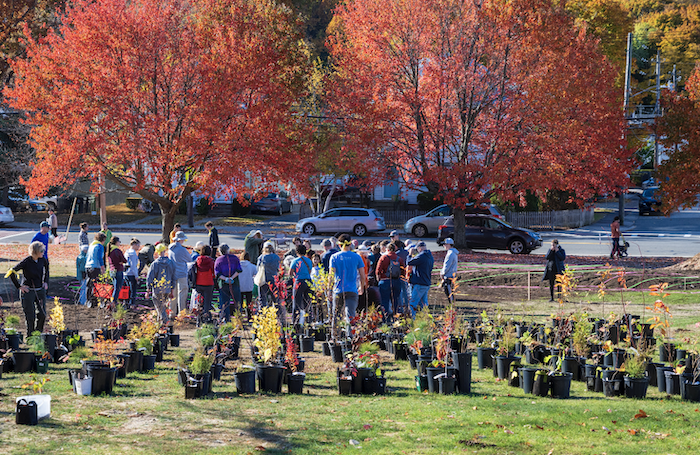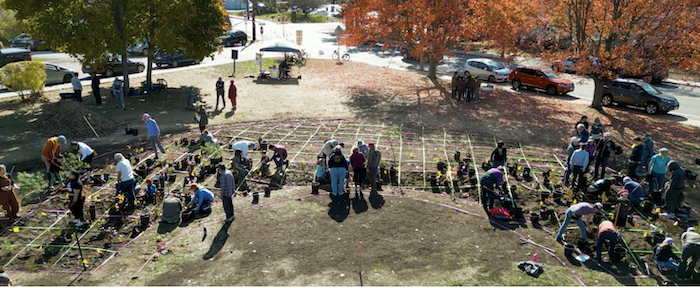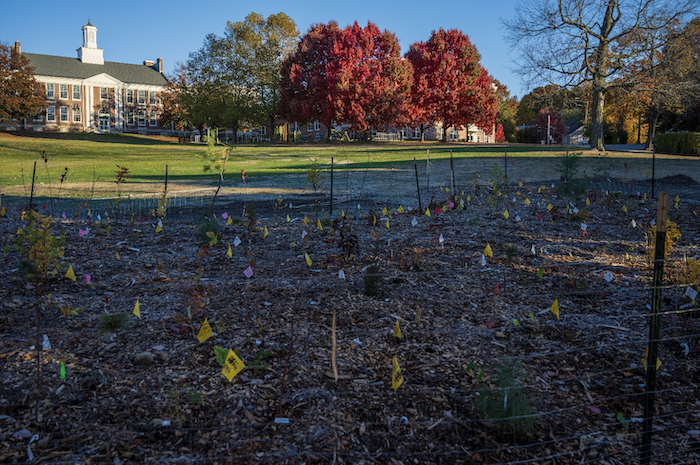
by Anita Roy Dobbs and Libby Shaw
Forests for Watertown, Trees for Watertown
On a warm, sunny Saturday at the end of October, over 200 Watertown community members came together to plant Watertown’s first Miyawaki Forest at the JR Lowell Elementary School near the corner of Orchard and George Streets. Volunteers aged 3 to 93 planted nearly 750 trees and shrubs of some 50 native species in just five hours.
The result of this remarkable community effort is a new kind of urban green space. The “Miyawaki Method” creates a mini-forest that grows quickly and supports abundant wildlife. Due to careful soil preparation, species selection and distribution, and planting density, a Miyawaki Forest can become self-sustaining within just three years. The resulting dense growth of forest natives benefits the surrounding urban community by cleaning and cooling the air, absorbing stormwater and carbon dioxide, and providing wildlife habitat. It quickly becomes a special place where residents can enjoy a spot of “wild” right in the city.
Watertown’s new Community Miyawaki Forest at the Lowell School offers an additional benefit. Its design creates a semi-circular outdoor classroom space where students can learn about the natural environment while directly observing the forest. Once the forest has taken root, the area will be made ADA accessible; meanwhile, temporary seating is supplied by logs from the Watertown Forestry Department.

This mini-forest is the result of a remarkable collaboration over many months by the Trees for Watertown working group, Forests for Watertown, in concert with the City of Watertown, Watertown Public Schools, horticultural and arboricultural experts from within and outside Watertown, and many Watertown community members, with financial support from two important sources: The Bosch Community Fund and The Watertown Community Foundation. What follows is a brief history of how this achievement came about, and a recognition of the many contributors whose time, thought, and energy made it happen.
The idea to plant a Miyawaki Forest in Watertown was germinated in the fall of 2022 by Liza Ketchum, author of books for middle grade and young adult readers, and Anita Roy Dobbs, a Watertown environmental activist and board member of Trees for Watertown. Liza was inspired by the first Miyawaki Forest in New England, planted September 2021 at Danehy Park in Cambridge. Anita was inspired by a TED Talk by Shubhendu Sharma, an influential proponent of the Miyawaki Method.
In March, 2023, several other community members joined Liza and Anita to form the “Watertown Miyawaki Team,” which became Forests for Watertown (FFW) after Trees for Watertown adopted it as a working group that fall. Anita became the de facto project manager and continues in this key role. Bron Sutherland assisted at several other regional Miyawaki plantings to scout out essential information and, with Joanne Donovan, is leading the 3-year Lowell Forest maintenance effort. Sarah Ryan advised on structural organization, coordinated volunteer planters, and is exploring next projects. Other core FFW team members are Rachel Danford, Cathy Miner Hartenstein, Laura Berman, Lisa Lin, and Eileen Zubrowski.
Linda Relson, Corey Barr, Marilyn Salvas and Judy Fallows of Watertown Community Gardens
(WCG) also participated from the beginning. Linda and Corey helped shape the project early on and helped grow tree seedlings over the summer. Marilyn contributed in many ways, from caring for tree seedlings to data-sorting volunteer sign ups. Judy Fallows, Watertown Elementary School Gardens Coordinator, assisted in every aspect of the project, from writing grants to coordinating with the Schools to obtaining tools and work gloves.
These four and others from WCG will be even more involved in the next phase of the project,
when Community Garden plots will be installed next Spring near the new forest.

A Miyawaki forest requires native species of trees and shrubs that would be found nearby in a mature forest. The Lowell site is a gentle, south-facing slope, with well-draining soil and plenty of sun, in what is known as the Boston Basin Ecoregion, and species selection needed to be suitable for this site. Two members of Trees for Watertown had first to final say in deciding the tree-shrub species list: Genie Johnston, who is the TFW Tree Ambassador, and Patrick Fairbairn, a botanist and wetland scientist well known for his work on Whitney Hill Forest. Horticulturist and TFW member Ellen Menounos initiated contact with local tree nurseries, and the species list was revised to reflect the species available, with substitution advice from Walter Kittredge of Oakhaven Sanctuary and Russ Cohen, a native edible species propagator. Luca Kaskiewicz of 1 acre of trees guided the Miyawaki Team on the care and transplanting of tree seedlings and became the group’s chief consultant and trainer once funding was obtained.
While FFW was in early research and planning, the City was discussing its own plans to plant a Miyawaki Forest as an expansion of green infrastructure under the Resilient Watertown Climate & Energy Plan. Simultaneously, the City and Watertown Community Gardens were searching for a place to install community garden plots, which had been reduced to an all-time low by development.
Late in 2023, Trees for Watertown was invited by the Bosch Community Fund to submit a grant proposal for a project to benefit the community and support STEM education for students. The prospect of that funding accelerated the talks between City, WCG, and FFW.
After an extensive site search, the JR Lowell Elementary School location was selected, and the FFW, WCG, and City teams joined forces, with DPW support. Even as the grant proposal was being written, the Watertown Schools joined the collaborative team. The TFW Board submitted an application for FFW’s Miyawaki project, and community outreach began.
In April 2024 the Bosch Community Fund awarded TFW a grant of nearly $25,000 for the Watertown Community Miyawaki Forest. Soon after, the Watertown Community Foundation provided an additional grant of $1,750 in support of forest-related educational activities with the school and community.
Laurel Schwab, Sustainability Program Manager, and Michelle Moon, Senior Planner for Open Space, are project liaisons for the City. They participated in lead-up events and all of Planting Day, along with Katie Swan, Watertown’s Environmental Planner/Conservation Agent. Watertown Tree Warden Mike Micieli was chief project coordinator for Watertown’s Department of Public Works, and frequently attended FFW project planning meetings. The project is indebted to DPW’s Forestry Crew – Phil Clark, Kevin O’Brien, and Dan Jewers – for their help in preparing the soil and watering the forest regularly, and to City Engineer Tyler Glode, Watertown Director of Planning and Zoning Gideon Schreiber, Parks & Cemetery Supervisor Bob DiRico, and DPW Director of Administration and Finance Michael Albano for their advice and counsel.

Thanks go to Lowell School Principal Stacy Phelan and Assistant Principal Tara Rufo, Teachers Haynes Altobello and Elizabeth Kaplan, and to Superintendent Dr. Deanne Galdston, for the School support and engagement that brought many parent-child Planting Teams to participate on Planting Day, as well as beautiful student artwork to grace the forest site.
All the project organizers deeply appreciate the support, enthusiasm, curiosity, and help of the Watertown Community; City Councilors Nicole Gardner, Vincent Piccirilli, and Caroline Bays; State Representative Steve Owens and family; Watertown community organizations Friends of Bees, Pollinator Pathways, and Watertown Faces Climate Change; and the Watertown Free Public Library and Hatch Makerspace.
There’s plenty of work ahead to steward the Watertown Community Miyawaki Forest during its first three years, to experience it through art and science events, and to work on possibilities for more Miyawaki Forests in Watertown. Learn more and Sign Up for Miyawaki Forest news and opportunities to participate.
Final Notes:
- You can see video from the Lowell Forest Planting Day in WCATV’s October 31 Cable News program (the Planting Day segment starts five minutes in).
- Sign up here if you’d like to become a member of FFW’s parent organization, Trees for Watertown. New members are always welcome.
- Children’s author and Forests for Watertown founding member Liza Ketchum has co-authored a picture book about Akira Miyawaki, father of the international Miyawaki Forest movement. Keep an eye out for Green Heart, Tiny Forest, which will be published in the fall of 2025.
